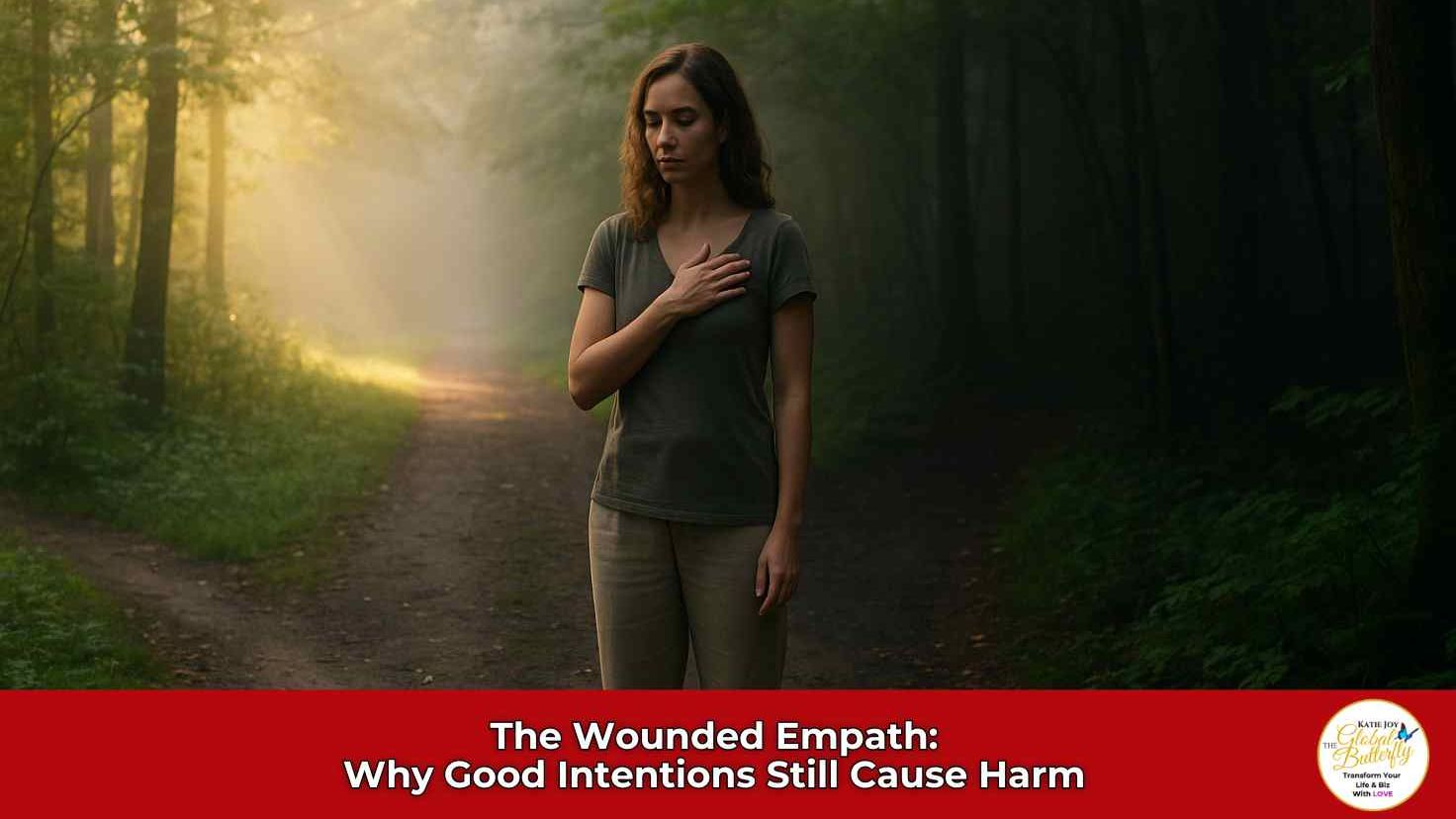
The Wounded Empath: Why Good Intentions Still Cause Harm
By Katie Joy, The Global Butterfly
We’ve all met them. The ones who feel deeply, care immensely, and give endlessly. They might even call themselves empaths — and they’re not wrong. But sometimes, behind all that giving is a storm of unhealed wounds that, left unchecked, can create just as much damage as the people they claim to protect others from.
This is the shadow side of the empath.
This is the Wounded Empath.
What Is a Wounded Empath?
A wounded empath is someone who genuinely feels for others — often deeply — but whose actions are driven not by clarity or wholeness, but by unprocessed pain, shame, and a deep-seated need to feel safe or seen.
Their good intentions are real. But so are the manipulations, projections, control, and broken boundaries that often follow.
These behaviours aren’t usually malicious. In fact, they’re often unconscious. But they still leave harm in their wake — and can be just as confusing and draining as a relationship with a narcissist.
Because the behavioural patterns can look nearly identical.
Wounded Empath or Narcissist?
Let’s be clear: wounded empaths are not narcissists.
But when they haven’t done their healing work, their shame and survival strategies take over. This results in:
-
Over-helping or martyrdom
-
Emotional enmeshment masked as “care”
-
Passive-aggressive guilt-tripping
-
Playing the victim to avoid accountability
-
Masking control as “protection” or “love”
In contrast, narcissists tend to be grandiose, overtly manipulative, and entirely self-serving.
But here’s the kicker: the impact on others is often the same. The exhaustion. The confusion. The self-doubt. The drain on your energy. And the strange feeling of being emotionally hijacked, even though they “meant well.”
A Fictional Example: Georgia from Ginny & Georgia
Netflix’s Ginny & Georgia gives us a perfect pop culture example of this archetype.
Georgia Miller is smart, stylish, fierce — and emotionally complex. On the surface, she’s a devoted single mum doing whatever it takes to protect her children. But look deeper, and we see a woman riddled with shame, trauma, and secrets.
She manipulates situations and people to maintain control. She lies to her kids under the guise of “protection.” She swings between charisma and chaos. She gets things done — but at what cost?
Georgia is not a villain. She’s a survivor. But survival strategies rooted in unhealed trauma can turn into a toxic cycle — one where love becomes conditional, safety becomes control, and emotional truth gets twisted.
This is the energy of a wounded empath in action: fiercely loving but unconsciously harming.
Real-Life Examples Without the Netflix Gloss
In my coaching journey, I’ve witnessed real-life versions of this dynamic — individuals who sincerely wanted to heal, help, or connect, but whose unresolved inner wounds led to:
-
Repeated blame-shifting when held accountable
-
Abandoning commitments, then twisting the story to be the victim
-
Smiling to your face while energetically attacking or withdrawing support behind the scenes
-
Needing constant validation for their “goodness” but unable to sit with feedback
These aren’t evil people. In fact, they often identify as spiritual, empathic, and “light-filled.” But without doing the deeper healing work, their “light” can become just another mask for shame.
Why Good Intentions Are Not Enough
Intentions matter. But so does impact.
Empathy without boundaries becomes enmeshment.
Care without self-responsibility becomes control.
Love without healing becomes manipulation.
And when someone isn’t willing to look at their own patterns — especially when those patterns hurt others — then their “goodness” becomes a weapon.
“Hurt people hurt people. Healed people heal people.”
It’s not just a cliché — it’s a spiritual truth. Until we address the pain we carry, we’ll unconsciously pass it on, no matter how ‘kind’ we believe we are.
Healing the Wounded Empath Within
If you resonate with this — either because you’ve experienced it in others, or you’ve seen glimpses of it in yourself — know this:
There is no shame in being wounded.
But there is responsibility in what you do with your wounds.
Healing the wounded empath means:
-
Sitting with your shame without projecting it
-
Taking full accountability for your behaviour
-
Learning how to hold space for others without losing yourself
-
Doing the inner work before trying to “help” everyone else
It’s not always easy. But it’s necessary — if we want to break cycles of harm and step into aligned, soulful leadership.
Final Thoughts
The wounded empath is not your enemy. They are often your mirror — showing you where you once were, or where you could unconsciously go if you abandoned your own healing.
They don’t need to be vilified.
But they also don’t need to be excused.
The path forward is compassion with boundaries, love with discernment, and healing with radical self-responsibility.
Because ultimately, it’s not just about how you feel — it’s about the energy you bring, the choices you make, and the legacy you leave in the hearts of those around you.
✨ Ready to reclaim your energy and stop the cycle of over-giving?
Take my free Energy Audit and discover where your energy is being drained — and how to call it back.
👉 Click here to get instant access to the Energy Audit.
The Energy Audit helps you to:
-
Reflect on misaligned energy exchanges
-
Identify patterns of over-giving or energetic leaks
-
Begin to take radical responsibility for your energy and boundaries






